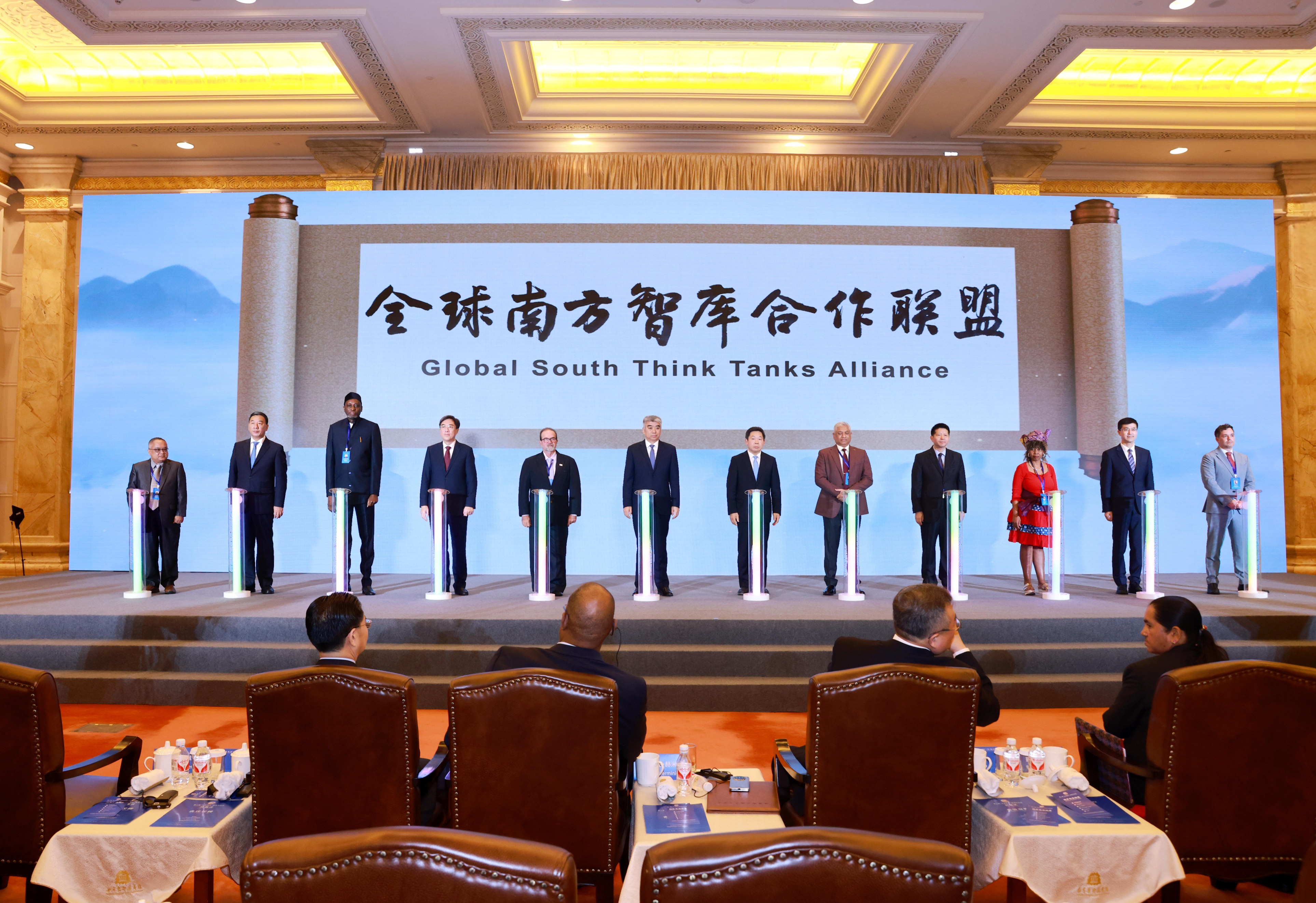
The scene of the second Global South Think Tanks Dialogue
From November 13 to 15, the Second Global South Think Tanks Dialogue, themed “Global South: Equality, Openness, and Cooperation”, was successfully held in Nanjing. The event was jointly hosted by the International Department of the CPC Central Committee (IDCPC), the CPC Jiangsu Provincial Committee, and Chinese Council for BRICS Think Tank Cooperation. Liu Jianchao, Minister of the IDCPC, and Xin Changxing, Secretary of the CPC Jiangsu Provincial Committee and Chairman of the Standing Committee of Jiangsu Provincial People’s Congress, attended the opening ceremony and delivered speeches. Over 400 Chinese and foreign representatives from more than 100 emerging markets and developing countries, including Brazil, Russia, India, South Africa, and Egypt, participated in the event. Led by the IDCPC, Global South Think Tanks Alliance was launched in collaboration with over 200 domestic and international think tanks and universities. The Guangzhou Global South Research Center of SIGI became one of the founding members of the alliance.
Opening Session
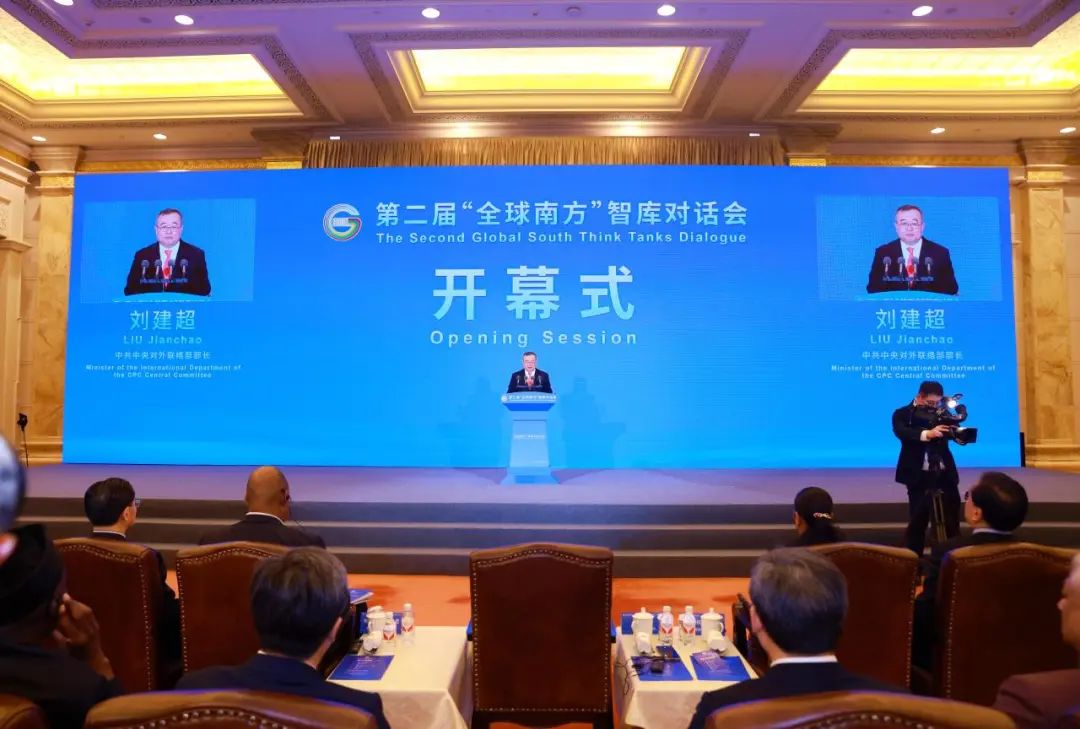
Remarks by Liu Jianchao, Minister of the IDCPC
At the opening session, Minister Liu Jianchao delivered a keynote speech, stating that the world is undergoing accelerated changes unseen in a century, entering into a new period of turbulence and transformation. In response to the pressing question of “where is humanity headed ?” the Global South has taken active steps, achieving a collective rise and playing a pivotal role in advancing human progress. As an important member of the Global South, the Chinese side is willing to work with other Global South countries to carry forward the spirit of the Global South featuring independence and autonomy, unity and mutual assistance, fairness and justice, and openness and inclusiveness, further deepen unity and cooperation, pursue together development and revitalization, safeguard world peace, promote the advancement of civilizations, improve global governance through joint consultations, and co-build a community with a shared future for the Global South, so as to make our due contributions to the building of a community with a shared future for mankind. Last month, at the “BRICS Plus” Dialogue held in Kazan, Russia, President Xi Jinping proposed that China will coordinate with others to form the Global South Think Tanks Cooperation Alliance to promote people-to-people exchanges and experience-sharing in governance. To implement the important initiative, the Global South Think Tanks Alliance was established at the dialogue. The Global South Think Tanks should leverage expertise in research, coordinate efforts to making proposals on state affairs and building consensus, deepen exchanges and cooperation, and contribute more wisdom to the collective development of the Global South.
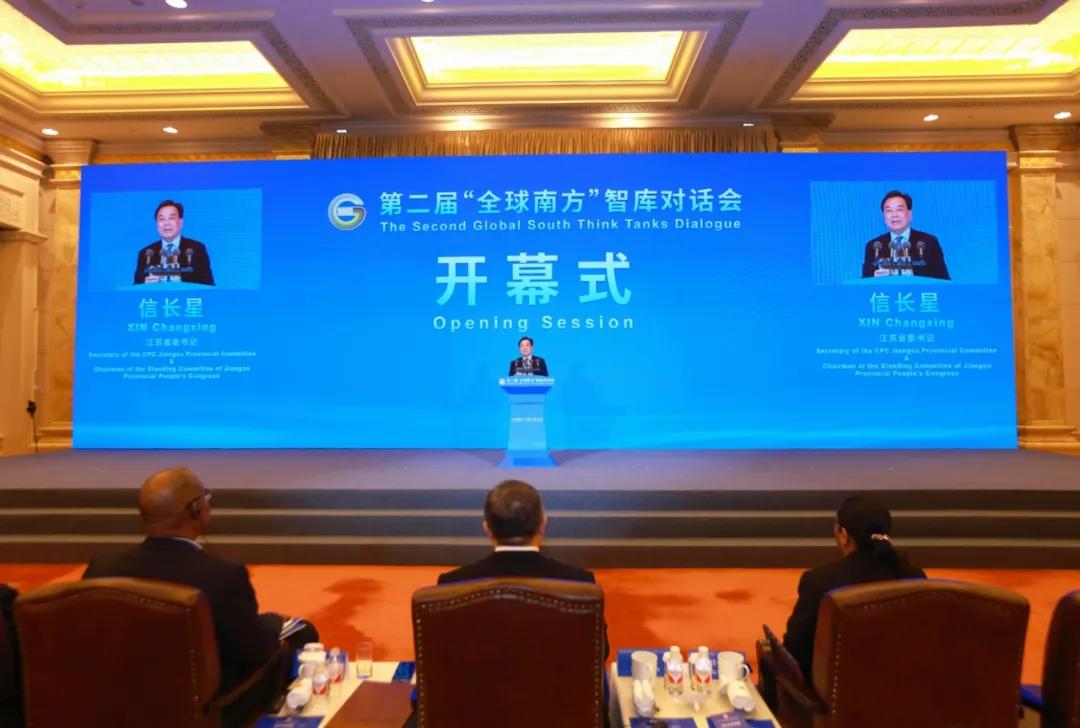
Remarks by Xin Changxing, Secretary of the CPC Jiangsu Provincial Committee and Chairman of the Standing Committee of Jiangsu Provincial People’s Congress
Secretary Xin Changxing remarked that not long ago, President Xi Jinping proposed three key initiatives for Global South cooperation during the “BRICS Plus”Dialogue. These initiatives not only address the urgent need for the Global South to pursue peace, development, and cooperation but also demonstrate China’s firm commitment to working hand-in-hand with the Global South toward shared development. Jiangsu province is located on the eastern coast of China, at the intersection of the Belt and Road. It is advancing high-level opening-up and building a two-way open hub with global appeal. We are willing to work together with all parties to continuously implement the Global Development Initiative (GDI), the Global Security Initiative (GSI), and the Global Civilization Initiative (GCI) in an in-depth way. By strengthening practical cooperation in areas such as sister city relations, trade and investment, education and training, healthcare, and cultural exchange, we aim to be steadfast supporters and active practitioners of Global South cooperation, contributing to common prosperity, universal security, diversity, and harmony among all civilizations. Furthermore, we are ready to support research, exchange, and cooperation among think tanks of the Global South to the best of our ability, to jointly contribute more wisdom to global governance and prosperity.
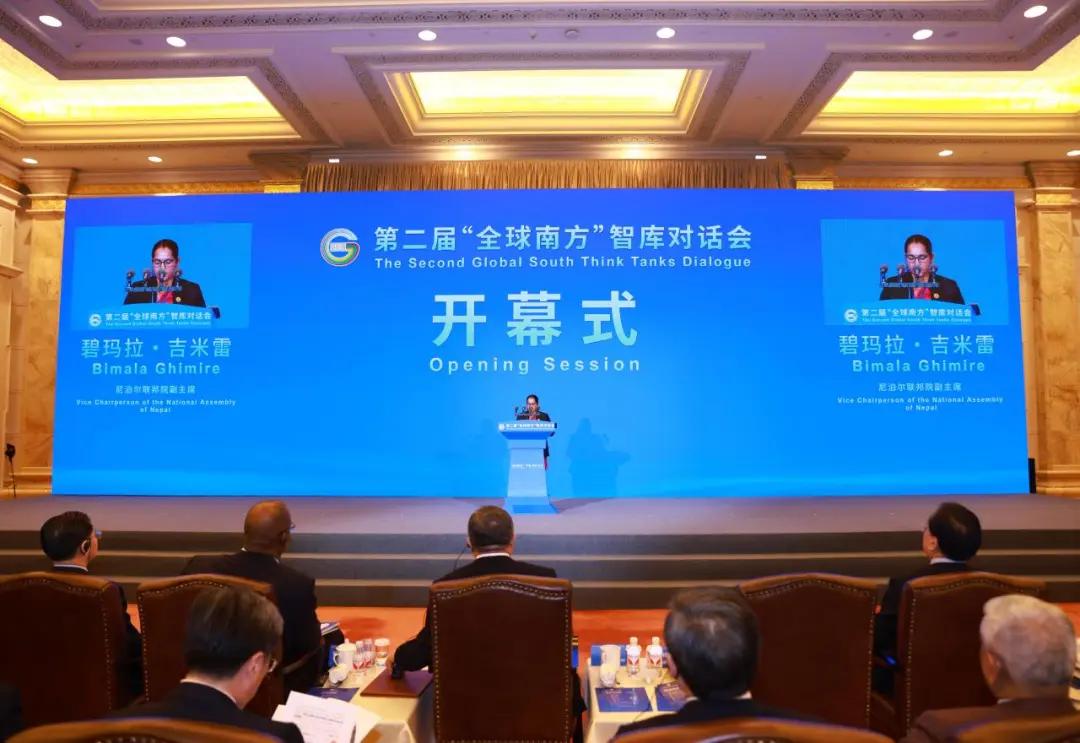
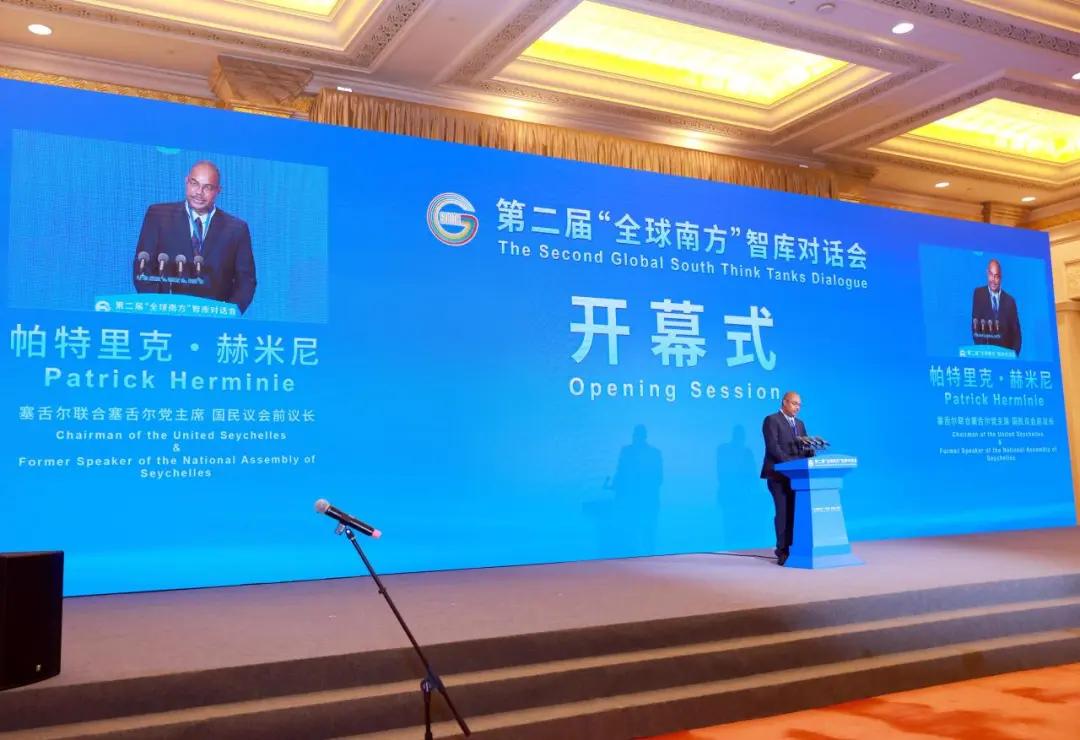
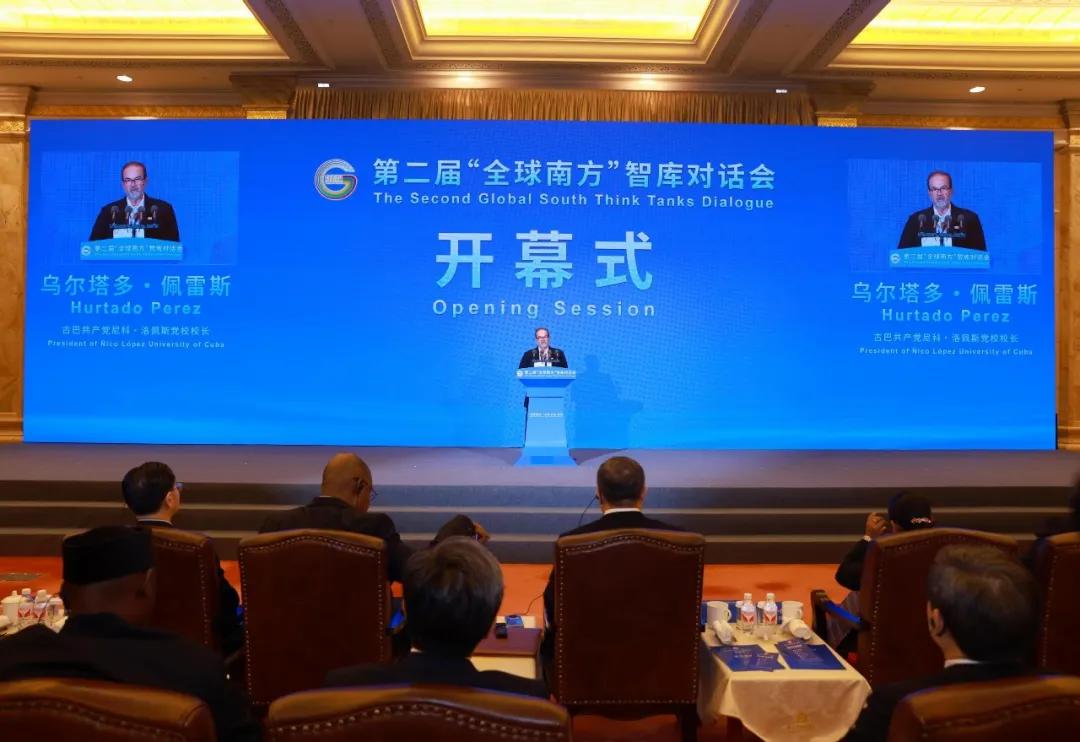
Remarks by Foreign Guests in Attendance
Foreign guests on site highly praised the tremendous achievements made by the Communist Party of China in leading the Chinese people toward modernization. They noted that President Xi Jinping’s important speech at the “BRICS Plus” Dialogue highlighted China’s commitment to fostering unity and cooperation within the Global South, bringing stability to a turbulent world. They expressed their willingness to work with China to implement the three global initiatives and promote the building of a community with a shared future for humanity. Bimala Ghimire, Vice Chairperson of the National Assembly of Nepal, stated that the Global South has become a new force for awakening and a new hope for change in today’s world, and should adhere to equality, openness, and cooperation to gather the wisdom and strength of the Global South. Patrick Herminie, Chairman of the United Seychelles Party and former speaker of the National Assembly of Seychelles, remarked that Global South cooperation helps countries from diverse cultural backgrounds enhance communication, foster mutual understanding, safeguard common interests, and promote global peace, stability, and development. Hurtado Perez, President of the Nico Lopez University of Cuba, said President Xi Jinping’s concept of a community with a shared future for mankind provides important guidance for addressing global challenges, with China being a proactive force in promoting Global South solidarity and cooperation. The Global South countries should practice true multilateralism and strive to build a more just, equitable, open and inclusive international order, so as to achieve peace, security, and common prosperity.
Professor Zhao Longyue from our school was invited to attend the conference and delivered a speech at a sub-forum
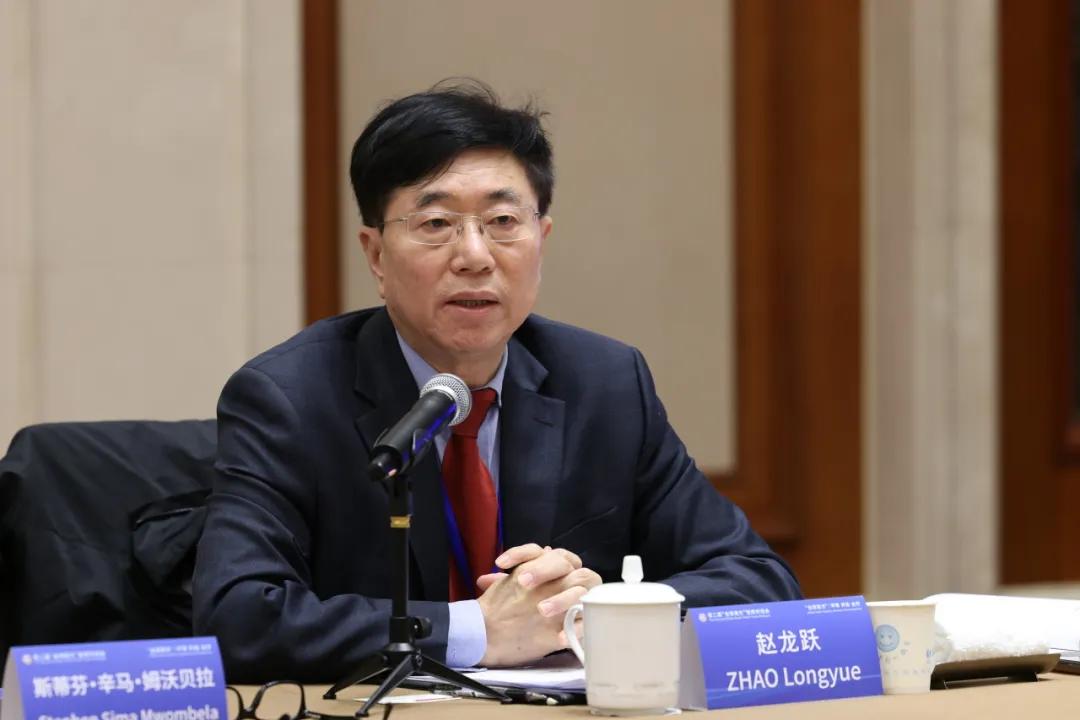
Remarks by Professor Zhao Longyue, Dean of the School of International Governance Innovation, Guangdong University of Foreign Studies
The Global South Think Tanks Dialogue also featured in-depth discussions on topics such as “Maintaining Peace and Security to Jointly Address Challenges”, “Promoting Open Development to Harness Development Synergies”, “Advocating Fairness and Justice to Improve Global Governance”, and “Deepening Civilizational Exchanges to Foster Common Progress”. Professor Zhao Longyue, dean of our school, was invited to speak at Sub-Forum II, where he shared insights on how Global South countries can further enhance openness and improve the effectiveness of cooperation.
First of all, Professor Zhao Longyue emphasized that a comprehensive understanding of the new characteristics of China’s high-standard opening-up in the new era is the foundation for promoting the opening-up scale and development of Global South countries.
He highlighted three significant features of China’s high-standard opening-up in the new era: First, the goals of opening-up and cooperation are more clearly defined. The goals of China’s high-standard opening-up in the new era extend beyond the development of China’s own economy and society. They focus on contributing to the building of a community with a shared future for humanity, aiming for global cooperation and win-win outcomes. This involves addressing global challenges, realizing the common interests of all humanity, and striving to build an open, inclusive, clean and beautiful world of lasting peace, universal security and shared prosperity.
Second, the content of opening-up and cooperation is more comprehensive. The content of China’s high-standard opening-up has expanded to include institutional openness, which goes beyond traditional areas such as goods, factor markets, and service trade. It emphasizes openness in rules, regulations, governance, and standards. Key initiatives, such as the construction of pilot free trade zones and the Hainan Free Trade Port, focus on aligning with high-standard international economic and trade rules, continuously optimizing the business environment, and advancing the modernization of the national governance system and governance capacity.
Third, the pathways for collaborative development are more refined. China’s high-standard opening-up in the new era is characterized by well-established mechanisms for high-quality Belt and Road cooperation based on extensive consultation, joint contribution, and shared interests. It also introduces new development concepts emphasizing balance, coordination, harmony, inclusivity, and equality. Through the comprehensive implementation of the Global Development Initiative, the Global Security Initiative, and the Global Civilization Initiative, China provides momentum for Global South countries to work together in fostering a more equal and orderly multipolar world order. It also powers the building a more open, inclusive, balanced and beneficial economic globalization.
After that, Professor Zhao Longyue proposed three key areas for Global South countries to advance opening-up and cooperation: participating in the formulation of international rules, seizing opportunities in digital transformation, and accelerating the cultivation of talent in international governance .
First, emphasizing and actively participating in the reconstruction and innovation of a new round of international trade and economic rules. Professor Zhao emphasized the importance of Global South countries participating in the formulation of international rules to promote reforms and improvements in the global governance system. This would enhance the position and influence of developing countries in global economic governance. On one hand, Global South countries should make full use of existing mechanisms to engage in negotiations and the formation of new rules and systems. On the other hand, they should collaborate to establish new mechanisms and platforms to jointly address challenges, propose action plans, and foster global cooperation. In particular, Professor Zhao called for Global South countries to work together within United Nations organizations to propose Global South action plans. He further suggested that, on the occasion of the 80th anniversary of the United Nations in 2025, the Global South should collaborate on developing the “Action Plan for Building a Global Community of Shared Future”, serving as a new program for achieving the United Nations’ Sustainable Development Goals (SDGs) by its centenary in 2045.
Second, seizing the historical opportunity of global digital transformation. The development of the digital economy and new technologies such as artificial intelligence presents a significant strategic opportunity for Global South countries to achieve economic leaps. Professor Zhao emphasized that these nations should cherish this new historical opportunity, engage in mutual learning, and promote shared progress to harness the benefits of digital transformation.
Third, prioritizing capacity building and talent cultivation. Professor Zhao Longyue noted that while the goals are clear, the key lies in action, and the core of that action is talent. He highlighted that the Global South Think Tanks Alliance provides an essential platform and opportunity for strengthening cooperation, enhancing capacity building, and accelerating the cultivation of high-standard professionals for international organizations and global governance. This, he stressed, is critical for advancing opening-up and cooperation and achieving shared progress among Global South countries.
Finally, Professor Zhao Longyue provided a detailed introduction to the Guangzhou Global South Research Center. He emphasized that the center’s core missions focus on two key aspects: The first is to strengthen theoretical and policy research on Global South issues in the new era.The second is to promote collaboration with international organizations within the United Nations system, particularly with organizations that focus on serving developing countries, such as the United Nations Conference on Trade and Development (UNCTAD), the International Trade Centre (ITC), and the “Group of 77 and China”. The goal is to establish Guangzhou as a central global city for policy consultation, talent development, and economic, trade, and investment cooperation, catering to the needs of developing countries in the Global South. Professor Zhao also extended a warm invitation to think tank experts from Global South countries to visit Guangzhou for exchange and collaboration.
The IDCPC has taken the lead in establishing the Global South Think Tanks Alliance

The Official Establishment of Global South Think Tanks Alliance
During the Global South Think Tanks Dialogue, and in line with the important initiative proposed by President Xi Jinping at the “BRICS Plus” Dialogue in Kazan, Russia, the Global South Think Tanks Alliance was officially launched. This initiative was spearheaded by the IDCPC in collaboration with the Chinese Academy of Social Sciences, China Media Group, Tsinghua University, Fudan University, Renmin University of China, and over 200 think tanks and universities from both domestic and international universities. The Guangzhou Global South Research Center of our school has been named as one of the founding members of the alliance.
The alliance is dedicated to advancing thought innovation within the Global South, leveraging expertise in research and investigation. It will focus on addressing shared challenges and global issues encountered during modernization processes, delivering intellectual public goods that align with historical trends and respond to global development needs. The alliance will also enhance policy communication among Global South countries by offering policy recommendations and advice to support informed, scientific, and democratic decision-making processes for governments. Additionally, it aims to strengthen the foundation for cooperation within the Global South by fostering cultural exchanges and collaboration in various forms. Through rational analysis, it seeks to resolve misunderstandings and misjudgments, deepen mutual trust and learning with professional insights, and help people worldwide gain a more comprehensive and objective understanding of Global South cooperation.
